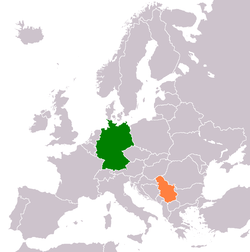German-Serbian relations

|
|
|
|
|
| Germany | Serbia |
Today, German-Serbian relations are shaped by the rapprochement between Serbia and the European Union, with Germany as the largest economy . Both states are members of the Council of Europe and the Organization for Security and Cooperation in Europe. Serbia is a member of the NATO Partnership for Peace . Germany and Serbia are linked by the Danube shipping route .
For a long time, Serbia was denied the status of a candidate for accession to the European Union because, from the point of view of the European Union, it did not cooperate sufficiently with the International Criminal Court for the former Yugoslavia . Even after the arrest of the last suspected Serbian war criminal in mid-2011, there were problems: Germany in particular opposed the granting of candidate status, as it accused Belgrade of a destructive role in the border conflict with Kosovo. In November 2011, numerous German soldiers were injured by Serb demonstrators in the border area. Following Serbian signals for a peaceful settlement of the Kosovo conflict, the state was granted candidate status on March 1, 2012.
history
In the assassination attempt in Sarajevo on June 28, 1914, the heir to the throne of Austria-Hungary , Archduke Franz Ferdinand , and his wife Sophie Chotek, Duchess of Hohenberg , were murdered by Gavrilo Princip , a member of the Serbian nationalist movement Mlada Bosna , during their visit to Sarajevo . The attack in the Bosnian capital sparked the July crisis from which finally led to World War I led. In this conflict, the German Reich stood on the side of the Austrians and was therefore one of the enemies of Serbia.
During the Second World War , the German Wehrmacht attacked the Serbian-dominated Kingdom of Yugoslavia in the Balkan campaign from April 6, 1941 , occupied it and set up a puppet government under Milan Nedić . (see also: Serbia in World War II )
In 1968 a recruitment agreement was signed between the Federal Republic of Germany and Yugoslavia to attract guest workers to the German economy. Many Yugoslavs stayed in Germany permanently.
During the Kosovo war in 1999, as part of Operation Allied Force, the Bundeswehr was deployed for the first time abroad with Germany directly participating in the war after the Second World War . a. Novi Sad was badly damaged. The German Air Force and the German Navy were involved .
people

The Serbian master brewer and National Bank President Georg Weifert was of German origin.
to travel
Since December 19, 2009, Serbian citizens can spend up to 90 days in the half-year without a visa in the Schengen area if they have a biometric passport . This regulation is controversial in Germany, especially because of fear of economic refugees from the Roma population group .
German citizens can stay in Serbia for up to three months without a visa. In addition to the passport, a German identity card is also accepted for entry .
Diplomatic missions
- Serbia has an embassy in Berlin and consulates general in Düsseldorf , Frankfurt am Main , Hamburg , Munich and Stuttgart .
- Germany operates an embassy in Belgrade .
See also
- Foreign policy of the Federal Republic of Germany
- List of German ambassadors in Serbia
- Serbs in Germany
Web links
- Information from the German Foreign Office on relations with Serbia
- The Serbian Ministry of Foreign Affairs on bilateral relations
Individual evidence
- ^ Agreement on visa facilitation
- ↑ EU plans visa compulsory for Balkan countries
- ↑ Foreign Office: Foreign Office - Serbia: Travel and Security Advice. Retrieved January 14, 2018 .
- ^ Embassy of the Republic of Serbia (German and Serbian) . Retrieved January 6, 2012.
- ↑ Embassy of the Federal Republic of Germany Belgrade (German and Serbian) . Archived from the original on January 20, 2012. Info: The archive link was inserted automatically and has not yet been checked. Please check the original and archive link according to the instructions and then remove this notice. Retrieved January 6, 2012.

